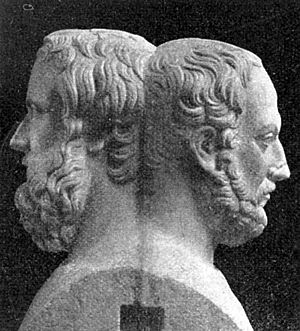Thucydides facts for kids
Quick facts for kids
Thucydides
|
|
|---|---|
| Θουκυδίδης | |
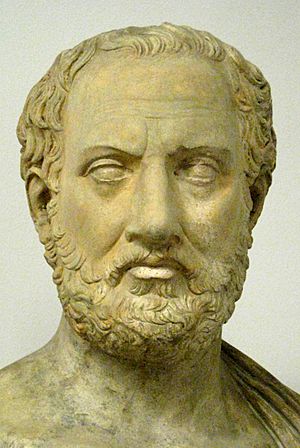
Plaster cast bust of Thucydides (in the Pushkin Museum) from a Roman copy (located at Holkham Hall) of an early fourth-century BC Greek original
|
|
| Born | c. 460 BC Halimous, Athens (modern Alimos)
|
| Died | c. 400 BC place of death unknown
|
| Occupation | Historian, general |
|
Notable work
|
History of the Peloponnesian War |
| Relatives | Oloros (father) |
Thucydides (/θ(j)uːˈsɪdɪˌdiːz/; Ancient Greek: Θουκυδίδης, romanized: Thoukudídēs; c. 460 – c. 400 BC) was an important Athenian historian and general. He wrote a famous book called History of the Peloponnesian War. This book tells the story of the big war between Sparta and Athens in the 400s BC. It covers events up to the year 411 BC.
Many people call Thucydides the "father of scientific history." This is because he tried to be very fair and used facts to explain why things happened. He did not say that the gods caused events. He focused on human actions and their results.
Thucydides is also seen as a founder of "political realism." This idea suggests that countries act based on fear and what is best for themselves. His book is still studied today in universities and military schools. Parts of his work, like the Melian dialogue and Pericles' Funeral Oration, are very famous. They help us understand how people and countries behave.
Thucydides also explored how human nature affects people during tough times. He wrote about events like plagues, massacres, and civil war.
Contents
Thucydides' Life Story
Even though Thucydides was a great historian, we don't know much about his personal life. Most of what we know comes from his own book, History of the Peloponnesian War. He tells us he was from Athens, who his father was, and where he was born.
He also wrote that he fought in the war and got sick with the plague. Later, he was sent away from Athens by the government.
Early Life and Family
Thucydides was an Athenian. His father's name was Olorus, and he came from a part of Athens called Halimous. There's a story that when he was young, around 10-12 years old, he heard the famous historian Herodotus speak. The story says young Thucydides was so moved that he cried with joy. He then decided he wanted to write history too.
This story might not be completely true. It probably comes from later writers. Thucydides survived the Plague of Athens, which killed many people, including Pericles. He also wrote that he owned gold mines in a place called Scapte Hyle in Thrace. This area was across from the island of Thasos.
His Time as a General
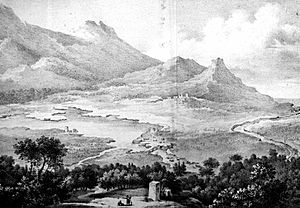
Because he was important in the Thracian area, Thucydides was sent as a strategos (a general) to Thasos in 424 BC. In the winter of 424–423 BC, a Spartan general named Brasidas attacked Amphipolis. This city was west of Thasos.
The Athenian commander in Amphipolis, Eucles, asked Thucydides for help. But Brasidas knew Thucydides was nearby. He quickly offered good terms for Amphipolis to surrender, and they accepted. So, by the time Thucydides arrived, Amphipolis was already controlled by Sparta.
Amphipolis was a very important city. Its fall made Athens very upset. Thucydides was blamed, even though he said it wasn't his fault. He claimed he just couldn't get there in time.
Life in Exile
After being exiled from Athens, Thucydides could travel freely. He visited both sides of the war. This helped him see the conflict from different viewpoints. This is all Thucydides wrote about his own life.
Other sources tell us more. His father's name, Olorus, was linked to Thrace and its kings. Thucydides was likely related to important Athenian leaders like Miltiades and his son Cimon. These leaders were part of the old noble families.
It seems his family owned a large estate in Thrace with gold mines. This made them very rich. This wealth allowed Thucydides to live there during his exile. He could then spend all his time writing history and doing research. He traveled a lot to gather facts. He was a wealthy man who, after leaving military and political life, used his money to study history.
Later Years and Death
Later writers give us more information, but it's less certain. One writer, Marcellinus, wrote about Thucydides' life about a thousand years after he died.
According to Pausanias, a man named Oenobius helped Thucydides return to Athens. This was probably after the war ended in 404 BC. Pausanias also says Thucydides was killed on his way back to Athens. His tomb was supposedly near the Melite gate. Many people doubt this story. Some evidence suggests he lived until 397 BC or a bit later.
Plutarch wrote that Thucydides was murdered in Skaptē Hulē (his Thracian estate). His body was then brought back to Athens and buried in Cimon's family plot.
Thucydides' book suddenly stops in the middle of the year 411 BC. People usually think this means he died while writing it.
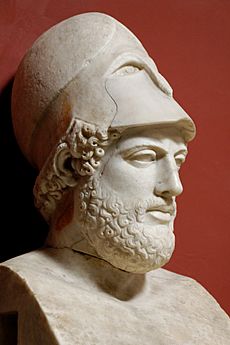
We can learn about Thucydides' personality from his book. He had a dry sense of humor. For example, when describing the Plague of Athens, he noted how people remembered an old rhyme about a "great death" coming with the Dorian War. He joked that if a famine came instead, people would remember the rhyme as "famine" and forget "plague."
Thucydides admired Pericles, a great Athenian leader. He liked how Pericles led the people. He did not like the leaders who came after Pericles, who he saw as trying to gain power by appealing to popular feelings. Thucydides thought democracy was good when guided by a strong leader. He was fair in his writing. He even wrote about his own failure at Amphipolis without trying to hide it.
Sometimes, his strong feelings show through. He was very critical of democratic leaders like Cleon and Hyperbolus. Some believe Cleon was connected to Thucydides being exiled.
It is thought that Thucydides cared about the pain caused by war. He worried about how bad human nature could become in such times. He wrote about terrible acts during the civil war on Corcyra, saying, "war is a violent teacher" (πόλεμος βίαιος διδάσκαλος).
History of the Peloponnesian War
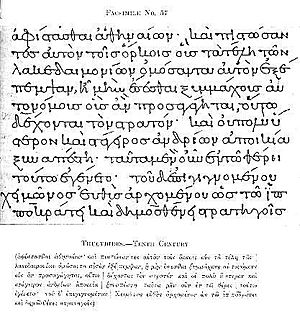
Thucydides believed the Peloponnesian War was incredibly important. So, he started writing his History at the very beginning of the war in 431 BC. He wanted his book to be "a possession for all time." The book ends suddenly in 411 BC, seven years before the war finished.
His History was changed and added to even after the war ended in 404 BC. After he died, his book was divided into eight parts. This was probably done by scholars in the Library of Alexandria.
Thucydides is often seen as one of the first true historians. Like Herodotus, who is called "the father of history," Thucydides valued what people saw with their own eyes. He wrote about events he was probably part of. He also carefully read documents and talked to people who were involved.
Unlike Herodotus, Thucydides did not believe that the gods interfered in human events. He focused only on human actions.
How Thucydides Wrote History
A key difference in Thucydides' writing style is his use of long speeches. He said these speeches were not exact quotes. Instead, they were what he thought should have been said. He did this because there were no recordings back then. This way, he saved the main ideas of what was said from being forgotten.
Thucydides did not write about art, literature, or daily life during the war. He saw his job as recording the events of the war itself. He left out anything he thought was not important to the main story.
Thucydides' Ideas
Paul Shorey called Thucydides "a cynic without moral feelings." He also noted that Thucydides believed human behavior was shaped by their surroundings and basic desires.
Thucydides' work shows he was influenced by the Sophists. These were teachers who questioned ideas about justice and right and wrong. He also seemed to know the ideas of philosophers like Anaxagoras and Democritus. These thinkers focused on facts and the natural world, not on gods. He also knew about some medical writings from the time.
Thucydides was very interested in how human intelligence, luck, and what must happen (necessity) all play a part. He thought history was often too unpredictable to guess what would happen next.
Thucydides and Herodotus
Thucydides and Herodotus were both very important Greek historians. They both had a big impact on how history is written in the Western world.
Herodotus wrote about the Persian Wars. But he also included information about geography, different cultures, and even fables he heard. He often presented different stories and let readers decide what they believed. He saw history as a way to teach moral lessons.
Thucydides, on the other hand, focused only on facts about political and military events. He used direct eyewitness accounts. Unlike Herodotus, he did not share his own beliefs or sources. Thucydides saw life as mainly about politics. He did not include moral lessons or details about geography or cultures. Later Greek historians looked up to Thucydides' writing as a model for truthful history.
Cicero called Herodotus the "father of history." But some, like Plutarch, criticized Herodotus for being too fond of "barbarians" (non-Greeks). Unlike Thucydides, most other historians still saw history as a source of moral lessons. This often meant their writings included their own opinions. Thucydides tried to report events without bias.
For a long time in Europe, people forgot about Thucydides and Herodotus. This was because they couldn't read Greek anymore. But their influence continued in the Byzantine world. In Europe, Herodotus became well-known again in the 1500s and 1600s. This was partly because of the discovery of America, which had new customs and animals.
The first European translation of Thucydides was into Latin, between 1448 and 1452. The first Greek version was published in 1502. During the Renaissance, Thucydides was less popular than Polybius as a political thinker.
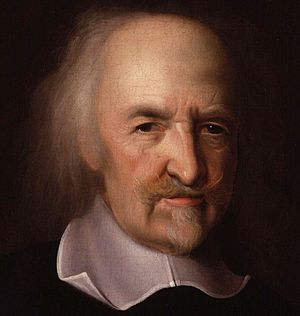
In the 1600s, the English thinker Thomas Hobbes admired Thucydides. In 1628, Hobbes was the first to translate Thucydides' writings directly from Greek into English. Thucydides, Hobbes, and Niccolò Machiavelli are seen as the founders of "political realism." This idea says that countries should focus on their military and economic power, not on ideals or ethics.
In the 1800s, historians admired Thucydides' serious approach. They liked his scientific way of looking at facts. Philosophers in Germany also greatly admired him. Johannes von Müller called Thucydides "the favourite author of the greatest and noblest men." Historians like Eduard Meyer and Leopold von Ranke, who started modern history writing based on sources, saw Thucydides as their role model.
However, these historians also admired Herodotus. They realized that social and cultural history was also important. This led to new ways of studying history in the 1900s.
Thucydides' ideas became very important in the field of international relations during the Cold War. This was through the work of thinkers like Hans Morgenthau and Edward Carr.
Some historians today argue that while critical history began with Thucydides, Herodotus took a bigger step. Herodotus looked at the past to understand why the present is the way it is. He searched for reasons behind events beyond luck or the gods.
See also
 In Spanish: Tucídides para niños
In Spanish: Tucídides para niños
- Speech of Hermocrates at Gela
- Thucydides Trap


